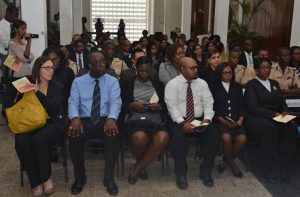Chancellor hails as timely opening of sexual offences court in the Ancient County
By Jeune Bailey-VanKeric
ACTING Chancellor of the Judiciary, Justice Yonette Cummings-Edwards said Tuesday that the opening of a sexual offences court in Berbice couldn’t have happened at a better time given the alarming statistics coming out of the County, and the sensitive nature of the successful prosecution of such offences.
“With the rise in the incidence of sexual offences, these specialised measures are needed now more than ever,” she said. “It has been the observation of experts and the local judiciary that the courtroom can be a harrowing place for victims. While judicial proceedings are essential in restoring a sense of safety and confidence in the survivors, inadvertently, survivors are victimised when trying to seek justice. Consequently, victims are oftentimes hesitant to come forward and report sexual violence cases due to the procedure,” Justice Cummings-Edwards told those gathered on the foyer of the Berbice High Court, in which building the specialised court is housed, for the commissioning ceremony.
The multi-million-dollar modification to accommodate the court included outfitting the facility with the usual courtroom furniture but with such additional features as a special-measures room which allows the victim to feel safe while still able to closely follow the proceedings without the offender being any the wiser that she’s there in the same court.
The commissioning of the $13M facility in the Ancient County, follows the opening of the first ever such court in all of the Caribbean here in Georgetown at the Demerara High Court.
In her address, Justice Cummings-Edwards noted that Guyana has come a long way in recognising its responsibility in protecting its citizens through the implementation of legislative measures, the core pieces of which are: The Domestic Violence Act, Sexual Offences Act and the Combating of Trafficking in Persons Act.
According to Justice Cummings-Edwards, “Given the nature of sexual offences, special responses are necessary for survivors, as the impact of sexual abuse has lasting emotional and psychological effects on the survivors.”
To better drive home the point she was making, she quoted Justice Desiree Bernard, who, while delivering a lecture at the Mona campus of the University of the West Indies in Jamaica on November 29, 2006, said, “Sexual violence preys on, and affects one’s emotion, and leaves behind the deepest psychological scars. It is also ubiquitous, in that it can be perpetrated anywhere on any victim, regardless of age, gender, or social standing.
The youngest infant is equally liable to be sexually assaulted, as the oldest adult, either in the privacy of the home, the workplace or in dark secretive places away from public view.”
And to cap it all, she quoted Justice Bernard as also saying that “in developing countries, research suggests that rape is an ever-present threat, and sometimes daily occurs for million of women.”
At that point, she reminded her audience of the special needs of sexual offences victims; needs that require specialised skills that can only be developed from dedicated court personnel operating at a specialised court with specialised equipment that respond to such special needs.

“The aim of the Sexual Offences Court is to, at best, minimise revictimisation of survivors of sexual violence, by providing facilities that would support victims as they give their evidence in court. Additionally, the Court is to ensure that the environment is conductive to victims,” Justice Cumming-Edwards said, adding: “As such, the Court is furnished with the necessary equipment to protect victims from having to see the accused and the persons in the courtroom when giving their evidence.”
Weighing in on the timeliness of the opening of the facility in Berbice was Deputy British High Commissioner, Ray Davidson, who used the case of Frances Andrade, a British professional violinist who took her own life rather than live with the humiliation of being made to look as if she was making the whole thing up, to reinforce the importance of treating with sensitivity the prosecution of sexual offences matters.
Andrade a mother of four, who was 48 when she died, and was 14 when the abuse began
back in 1978, committed suicide in January 2013, after testifying against her abuser, her former music teacher, just when the matter was about to come to a close.
“Reliving her experience was a nightmare, as she felt she was being attacked, and at one point she even doubted herself. The pressure and humiliation was too much, and within a week of giving her evidence, she took her life,” Davidson said, adding: “The case prompted a debate into how courts should handle such cases. Special measures have been gradually implemented in the UK to make it easier for vulnerable or intimidated witnesses to give evidence in court.
“The new system you have here replicates much of what is being done in the UK; it might encourage others who have suffered abuse to come forward and feel comfortable in knowing they will be treated with respect and dignity.”
In her remarks, Sylvia Fouet, UNICEF Resident Representative, whose organisation contributed $9M towards the project, noted that the Sexual Offences Court gives survivors the right to be heard and the opportunity to be healed.
“UNICEF particularly partners to make the Court child-friendly and user-friendly, so that persons will not be afraid to receive justice and healing,” Fouet said.
Among those attending the historical event were Chief Justice Roxanne George, who chaired the event; Susanna Lovell, Registrar of the Supreme Court, who moved the vote of thanks; and Secretary of the Berbice Bar Association, Adrian Anamayah.




.jpg)









